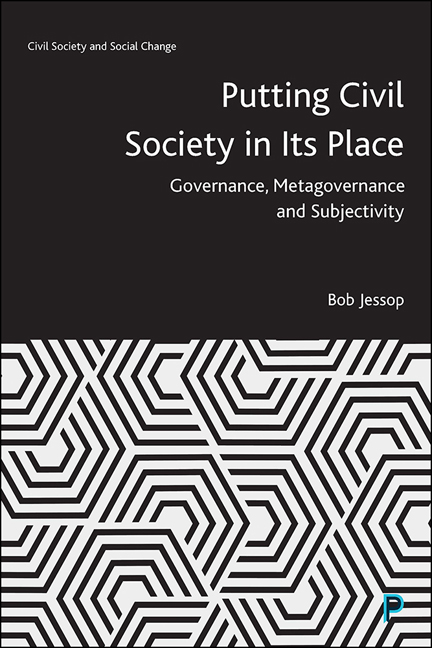Book contents
- Frontmatter
- Dedication
- Contents
- List of Tables and Figures
- Abbreviations
- Note on the Author
- Acknowledgements
- Licensing Information
- Preface
- 1 Introduction
- Part I Complexity, Contingency and Governance
- Part II Locating Civil Society as a Mode of Governance
- Part III Governance Failure and Metagovernance
- Endnotes
- References
- Index
10 - Competitiveness vs Civil Society as Modes of Governance
Published online by Cambridge University Press: 18 March 2021
- Frontmatter
- Dedication
- Contents
- List of Tables and Figures
- Abbreviations
- Note on the Author
- Acknowledgements
- Licensing Information
- Preface
- 1 Introduction
- Part I Complexity, Contingency and Governance
- Part II Locating Civil Society as a Mode of Governance
- Part III Governance Failure and Metagovernance
- Endnotes
- References
- Index
Summary
Extending competition is often proposed as a simple solution to complex problems, yet competition is itself too complex a process to permit simple definition and implementation, and too complex for use as a mode of governance with predictable consequences. However, it has been a key element in New Public Management and, despite disappointing results, remains a major theme in reform proposals. Underpinning the nature and effects of actually existing competition are the competition landscape and the uneven distribution of resources and abilities to compete, whether or not these are fully activated in any given conjuncture. This poses questions of ‘competitiveness’ – which has again become an important object of state action. Yet this is another conceptually ambiguous, politically controversial and ideologically charged topic. As Robert Reich remarked, unfairly, the idea of national competitiveness moved from obscurity to meaninglessness without any intervening period of coherence (Reich, 1991, cited in Reinert, 1995). Although competitiveness is neglected in neoclassical economics, it does figure in heterodox economics and has also been mobilized to inform economic, political and societal strategies. There are many ways to define and measure it, and past and current economic, legal, political and policy debates indicate the many issues at stake. The two terms are also articulated in different ways in the ideas and practices of the competition state and competition law, and they are also deployed in efforts to promote competition as an ideal (and idealized) mechanism of governance within and far beyond the ‘economy’.
My argument proceeds in seven steps. It first considers how competition might become a principle of economic organization and relatedly, how it may become part of state projects and practices. Second, it comments on the discursive and material dimensions of competition, considering it as a social construct and a social constraint. Third, it examines the rather idealized representations of competition in the broader doxa of liberalism and neoliberalism considered in terms of a rough threefold distinction among economic, political and ideological imaginaries, and the limits to the reproduction of these doxa in terms of the complexities of capitalist social relations. Fourth, it explores the complexities of competition in the actually existing world and their role in differential accumulation.
- Type
- Chapter
- Information
- Putting Civil Society in Its PlaceGovernance, Metagovernance and Subjectivity, pp. 195 - 218Publisher: Bristol University PressPrint publication year: 2020

